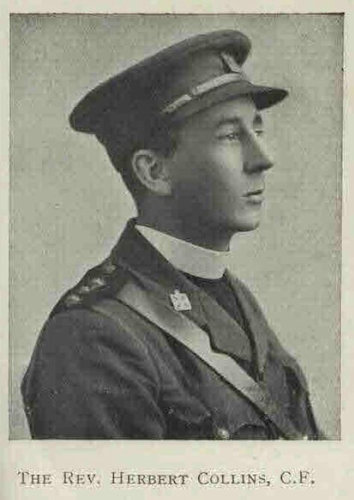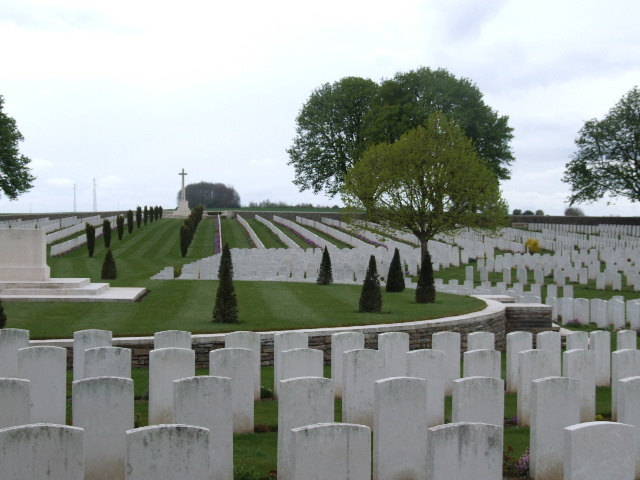Name
Herbert John Collins
Conflict
First World War
Date of Death / Age
09/04/1917
35
Rank, Service Number & Service Details
Chaplain 4th Class
Army Chaplains' Department
Black Watch (Royal Highlanders)
Awards: Service Medals/Honour Awards
Not Yet Researched
Cemetery/Memorial: Name/Reference/Country
CABARET-ROUGE BRITISH CEMETERY, SOUCHEZ
XVII. K. 10.
France
Headstone Inscription
Not Researched
UK & Other Memorials
St Edmunds College Memorial, Old Hall Green,
Ind. Plaque, St Edmunds College, Old Hall Green
Biography
The following text was transcribed from the The Edmundian (1814-1819) – The contemporary magazine of St Edmund’s College:
Herbert Collins entered St. Edmund's College on September the 17th, 1894, a slight merry boy with eyes that danced for joy in all the circumstances of boy-life; even in serious moments the eyes betrayed the soul. His Christian name was duly changed for its more affectionate form, and the name Herbert was relegated henceforth to official documents.
Happiness has, notoriously, no history, and the school life of this singularly happy boy held little that was, according to grown up standards, in the least degree exciting. His mental powers, and they were of a high order, took him, without interruption, and at an even pace, from Third Rudiments to Rhetoric; his healthy love of outdoor games brought him to the Captaincy, and his Christian gaiety of character in which was no alloy of weakness made him, whether as captain or bounds master, whether in class or in the bounds, supremely popular yet entirely unspoilt by his popularity.
In 1902 he proceeded to Oscott, where he spent five years. There too, his contemporaries can testify, he was 'omne omnibus,' besides acquitting himself with great credit in the schools. From Third Rudiments to the Priesthood there was never a pause, if we except two periods of delay, occasioned, the one by a broken leg, the other by an attack of scarlet fever, and serving, both of them, only to bring out his invincible good humour.
In June 1908 he returned to St. Edmund's for his final retreat before his ordination, which took place in the Chapel, which had seen his early growth in happy sanctity.
His work as a priest began at Brentford, and we thought him fairly launched on his career as a priest on the mission. But a strong right hand was sought for Father Bans, to carry on the work from which Father Goggin had been withdrawn for other duties, and Father Collins was chosen. It was a choice which has been more than justified by events. Before long, in spite of the misgivings with which he had begun, he was doing splendid work for the Crusade of Rescue. His unfailing cheerfulness helped to make his work more of a success than he was himself willing to believe. Already, as His Eminence the Cardinal said but recently, he was marked out as one who should take a leading part in charitable works in the Archdiocese of Westminster.
Before that could be, however, the Crusade of Rescue was called upon to make the sacrifice, temporary, as it was devoutly hoped, of Father Collins, who became Chap-lain to the forces. He was attached to the 9th Battalion Royal Highlanders (Black Watch). Into this work, too, he threw himself with all his joyous heart and generous soul, and quickly gained the esteem and affection of those about him. How he worked for and among his "boys" we gather some idea from numerous letters which have reached England, letters which are simple and direct, singularly innocent of artifice and the small change of lighter peace-time correspondence. His Colonel, his brother officers, his "boys," catholics or not, tell how they found in "our Padre " a very real friend whom they were proud and glad to know. The barrack-room "kick-up," the trenches at their worst, the action in the open, found him always the incorrigible optimist whose cheeriness was infectious. He was proud of his regiment; we know, also, though he would himself call the statement a chose pour sire, his regiment was proud of him.
It was intended that he should be decorated, and in Easter week we received the news : Father Collins killed instantly by a shell while he was on his way up to ar-range a site further forward for the Regimental Aid Post, and, on the way, to see whether any of the "boys" needed his help. Those same letters tell of the very real grief, of the gap, of the much that was missed among all ranks of the Black Watch when they had buried their Padre.
There is a pathos in it beyond words. The temporary interruption of his work became the end: the choice foundation for what have proved castles in the air; and all this mirth his photographs, even the last, chew it still gone out in tragedy. Yet, it is not merely sad, but very fitting, that we should think of him, still young., the same Bertie facing the last. big things as be had faced all that went before with the joyous expectancy of the boy who knows that Providence is responsible for him, and taking all that befell him, fearlessly, gladly, with a charming boyish grace.
Acknowledgments
Jonty Wild, Di Vanderson, The Edmundian (1814-1819) – The contemporary magazine of St Edmund’s College



